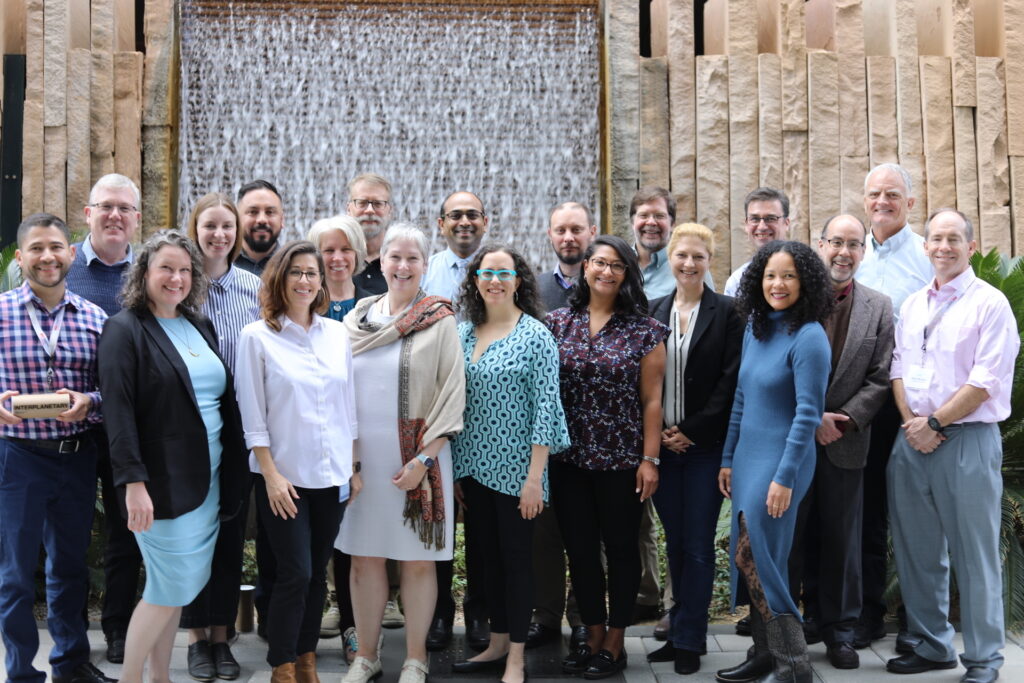Members advance goals to make research in space more accessible and diverse
On March 10, the Orbital Reef University Advisory Council held its second annual in-person meeting in Tempe, AZ. Orbital Reef is a next generation commercial space station being developed by Blue Origin and Sierra Space to replace the International Space Station (ISS) once it is retired by NASA by the end of 2030.
During the day-long Council meeting, the 15 member institutions reviewed their progress to date, advanced short-term objectives and set new goals. The mission of the Council is to leverage its collective assets and expertise to advance research, education and innovation in low Earth orbit (LEO) through the lens of equity, social responsibility and broad impact.
To pursue its mission, the Council is organized into three working groups: Research Support, Societal Connection and Research Guidelines and Ethics.
The Research Support group is focused on designing a more efficient and accessible process for researchers around the globe to pursue their research in LEO. This will be informed by investigating researchers’ current experiences with the ISS and by understanding the needs of researchers outside of the United States.

“The Council is addressing some of the most imposing questions of the next generation of research in Low Earth Orbit,” said Dr. Robert Ferl, Assistant Vice President for Research at the University of Florida. “Finding a good technical path for researchers, locating new sources of funding, and navigating the complexities of conducting experiments in space are all new issues for the research community. In the past, NASA was the only avenue through which experiments could be conducted in LEO, solving many of these issues yet limiting access. This new era of commercial space stations has opened up a host of new opportunities and attendant challenges. It’s exciting to be thinking about these opportunities and establishing new processes for the future of research in commercial LEO destinations.”
The Societal Connection team will create new distribution networks for established LEO-focused educational programs, with the goals of sustaining these important programs beyond the retirement of the ISS, implementing them beyond the United States, and inspiring the next generation in STEM. The initial focus will be on expanding the implementation of microgravity curricula based on actual experiments conducted on the ISS, in both middle and high schools and prioritizing Title I schools.
“It’s important to expose students, particularly those in historically underserved communities, to important scientific parameters such as gravity through real ISS experiments as early as possible,” said Debbie Senesky, Associate Professor of Aeronautics and Astronautics at Stanford University. “If we teach students the difference between Earth’s gravity and microgravity found in low-Earth orbit (LEO), it sets them up to excel in physics and mathematics courses in the future. With the ultimate goal of the STEM engagement programming to inspire more students to pursue space careers.”
The Research Guidelines and Ethics group is defining and exploring the impact of space-enabled technologies and activities through the lens of responsible innovation, examining how technologies developed in space such as artificial intelligence, geoengineering, and synthetic biology remain socially desirable and in the public’s interest.
They have advanced a new framework to help the space sector be intentional about creating more diverse and equitable access to space, including future commercial LEO destinations. The framework will be detailed in white paper titled “Not Just an Acronym: Diversity, Equity, Inclusion, and Accessibility as a Continuous Integrated Process in Space and on Earth”. The team intends to engage with communities advocating for DEIA to provide feedback and improve on the proposed framework.
As the Council takes steps to create capacity and opportunities for researchers and educators to access LEO, experts are encouraged to reach out to join the growing effort.
To learn more about Orbital Reef, visit www.orbitalreef.com/.